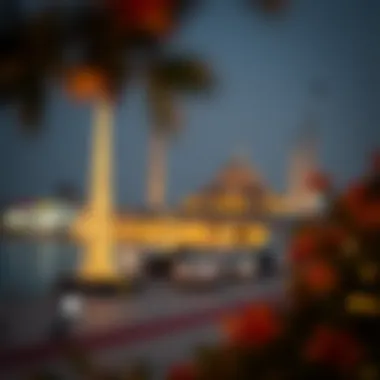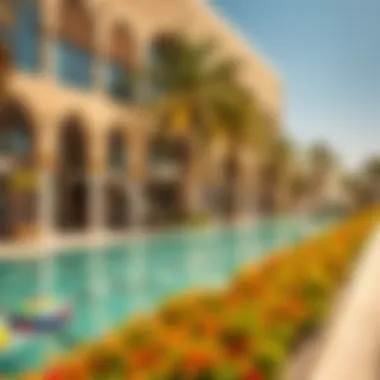Official Holidays in the UAE for 2023


Intro
The United Arab Emirates, a vibrant and culturally rich nation, boasts a unique tapestry of traditions and celebrations throughout the calendar year. These official holidays play a significant role in both the daily lives of residents and the broader cultural identity of the Emirates. Each occasion carries historical and religious connotations, reflecting the values and beliefs of Emirati society. This article delves into the official holidays of 2023, highlighting their significance and the various ways they are celebrated across the seven emirates.
As expatriates and investors engage with the local culture, understanding these holidays becomes crucial. It influences travel plans, community events, and local customs. This guide aims to provide a clear and coherent overview of these essential dates in 2023, bringing to light not only the days off but also the underlying meaning and the atmosphere they create among both citizens and expatriates alike.
Overview of Official Holidays in the UAE
Public holidays in the UAE hold great significance, as they serve not only as days off from work but also as markers of the culture, history, and social fabric of the nation. Each holiday offers residents and expatriates a chance to celebrate and reflect on the values that shape this diverse society. Understanding these holidays is vital for anyone living or doing business in the UAE, especially for investors, agents, and homeowners who must navigate the local customs and routines tied to these important days.
The official holidays in the UAE include both national celebrations and significant religious observances, each carrying its own unique meaning and traditions. These occasions permit communities to come together, foster national pride, and respect cultural diversity. For expats, engaging in local celebrations often deepens their connection to the UAE and provides valuable insights into the local way of life.
Here are some key elements to consider about the overview of official holidays in the UAE:
- Cultural Resonance: Each holiday reflects milestones in the UAE’s history or the Islamic calendar, reminding people of their heritage and shared experiences.
- Social Cohesion: Public holidays encourage gatherings with family and friends, enhancing communal bonds. You get to see a mix of backgrounds celebrating together, which can be a joy to witness.
- Economic Implications: Understanding holiday timings can play a crucial role in business strategies, impacting retail sales and tourism.
"The public holidays are more than just a break from work; they are woven into the very fabric of what it means to live in the UAE."
Getting a grip on the holiday calendar allows investors and expatriates to sync their plans, whether it’s for travel, major business events, or even just knowing when the streets will be packed during celebrations. Without this knowledge, you might find yourself caught off guard by closures or public events that affect daily life.
Thus, this article will delve into official holidays within the UAE for 2023 with a focus on the significance and cultural contexts surrounding each holiday, giving readers a comprehensive outlook on what each day represents and how it impacts life in the UAE.
Public Holidays Schedule for
The public holidays in the UAE represent more than just days off work; they play a significant role in the social and cultural fabric of the nation. Understanding the public holidays schedule for 2023 provides invaluable insights into how these occasions shape community bonds and economic activities. For investors, agents, expatriates, and homeowners, being aware of these holidays can greatly influence business operations, travel plans, and engagement with the local culture. The significance of this schedule lies in its ability to inform decisions and foster connections across these diverse populations.
New Year's Day
New Year's Day marks the beginning of the calendar year. Celebrated on January 1st, it’s a straightforward holiday, yet it carries a weight of expectation and renewal. In the UAE, this day is often filled with fireworks and festivities, particularly in urban areas like Dubai and Abu Dhabi. Many expatriates enjoy gatherings with friends and family, reflecting both their own cultural traditions and local customs.
Eid al-Fitr
Eid al-Fitr, which falls at the end of Ramadan, holds profound religious significance for Muslims across the UAE. The date is determined by the sighting of the moon, meaning it can vary each year. Often celebrated with family feasts, this holiday is a time of generosity and community spirit. Local eateries and hotels frequently host special iftar dinners, and it's customary to give to charity, known as "Zakat al-Fitr." This emphasis on community engagement creates a vibrant atmosphere during the holiday.
Arafat Day
The observance of Arafat Day is integral to the Hajj pilgrimage and occurs on the second day of Hajj. While many in the UAE participate in pilgrimage to Mecca, for those remaining behind, the day often includes prayer and reflection. Arafat Day serves as a reminder of spiritual examination and gratitude. It's also a holiday that underlines the importance of faith in daily life.
Eid al-Adha
Eid al-Adha, or the "Festival of Sacrifice," follows Arafat Day and commemorates the willingness of Ibrahim (Abraham) to sacrifice his son in obedience to God's command. This holiday typically spans several days and involves the ritual of animal sacrifice, with the meat distributed among family, friends, and the less fortunate. The event becomes a family affair, with gatherings filled with laughter and shared meals, showcasing the culinary delights of Arabic cuisine.
Hijri New Year
The Hijri New Year, observed on the first day of Muharram, marks the start of the Islamic lunar calendar. While this day might not conform to extravagant celebrations, it is a time for reflection and setting intentions for the year ahead. Businesses might close earlier than usual, providing employees the chance to spend this solemn day with their families. The significance of this day lies more in its cultural representation of the Islamic faith than in public celebrations.
Commemoration Day


Commemoration Day, observed on November 30, pays tribute to Emirati martyrs who have sacrificed their lives for the nation. It serves as a poignant reminder of bravery and national pride. Across the UAE, ceremonies and activities honoring the courage of these individuals are held. Local communities come together to honor and remember, reinforcing bonds of national unity.
UAE National Day
Finally, UAE National Day on December 2 marks the establishment of the UAE as a federation in 1971. This holiday fills the streets with colorful parades, fireworks, and cultural events celebrating Emirati heritage. It's a day of national pride, where both citizens and expatriates partake in festivities. The spirit of togetherness and celebration fosters a sense of belonging not just among Emiratis, but within the broader expatriate community as well.
Impact of Holidays on the Local Economy
The impact of official holidays in the UAE January 2023 stretches far beyond mere days off; it plays a pivotal role in shaping economic trends and consumer behavior throughout the year. Each holiday period creates a surge in activity across various sectors, notably retail and tourism, and can lead to significant shifts in business operations. The influence of these holidays is multifaceted, affecting everything from local businesses to global markets, making it essential for stakeholders to understand the broader economic implications.
Effect on Retail and Tourism Sectors
Holidays in the UAE have a profound influence on both the retail and tourism sectors, acting as a catalyst for economic stimulation.
- Retail Boost: During holiday periods, consumer spending typically spikes. For retailers, this means increased foot traffic and sales. For instance, Eid celebrations lead to heightened demand for clothing, gifts, and special food items. Seasoned business owners often use targeted marketing strategies to capitalize on these festive trends, offering promotions and discounts that lure in shoppers eager to celebrate. During Eid al-Fitr in particular, local shops and big-name brands alike invest heavily in advertising and merchandising, catering to the festive spirit.
- Tourism Surge: The UAE's status as a premier tourist destination means that holidays attract visitors from around the globe. Many travelers plan their trips around holidays, drawn by special cultural events, festivals, and celebrations unique to the region. For example, the UAE National Day features parades and fireworks that can attract large crowds.
"The holidays serve as a focal point for tourism, illustrating the vibrant Emirati culture to the world."
Additionally, hotels and travel agencies often create promotional packages, making it more appealing for both residents and tourists to explore the wonders of the UAE during these festive times.
Business Operations During Holidays
Public holidays also result in unique challenges and opportunities for businesses. The days leading up to and following a holiday often see fluctuations in operational capacity.
- Altered Hours: Many businesses, especially those in the retail and hospitality sectors, adjust their hours to either accommodate higher customer volumes or close altogether for the holiday duration. Establishments must strategically plan staffing to manage this ebb and flow effectively. Employers often hire temporary staff or adjust employee schedules to ensure smooth operations during peak times.
- Supply Chain Dynamics: The holidays can impact supply chains as businesses must forecast demand effectively. During times like Eid, businesses ramp up inventory, anticipating increased sales. However, if not managed wisely, delays in shipping or stock shortages can lead to lost revenue.
In the grand scheme of things, effectively leveraging these holidays is crucial for businesses that wish to thrive in a competitive market. Understanding the economic trends tied to these celebrations can inform better strategies and operational decisions.
In summary, the interplay between public holidays and the local economy in the UAE brings challenges and opportunities alike. With the right approaches in place, businesses can turn these days into profitable periods, all while enhancing the quality of life for residents and visitors alike.
Celebration Practices in
In the United Arab Emirates, the celebration practices surrounding official holidays are not just mere observances; they are woven into the fabric of national identity and cultural expression. In this section, we will take a closer look at how people in the UAE engage with their holidays, focusing on the vibrant customs and practices that bring communities together, reflect shared values, and highlight the rich heritage of the nation.
The significance of these practices extends well beyond simple festivities. They serve as moments for family gatherings, cultural engagement, and community bonding. In a diverse society where expatriates from all around the globe contribute to the local culture, understanding these celebration practices facilitates a deeper connection to the Emirati way of life.
Cultural Festivities and Events
Throughout the year, cultural festivities in the UAE paint a vivid portrait of the nation’s heritage. Each holiday brings with it its own set of unique events, many of which showcase the country's tradition and modernity side by side.
During Eid al-Fitr, for instance, the atmosphere is electric with celebrations. Cities are adorned with colorful lights and decorations; people partake in communal prayers, followed by visits to family and friends. Souqs and malls bustle with shoppers buying traditional attire, sweets, and gifts, offering a visual feast that attracts both locals and tourists.
There’s also the National Day, which is celebrated with grand parades and fireworks. These parades often feature displays of the UAE's cultural heritage, including traditional dance performances and music. Just like a vibrant tapestry, each act and performance narrates the story of the past while bridging to the contemporary.
Indeed, various events are organized to honor the Emirati spirit. Art exhibitions, poetry readings, and performances by local artists allow the community to celebrate creativity and talent, making each holiday an opportunity to not only reflect on the past but also inspire future generations.
Traditional Foods and Customs
No holiday in the UAE is truly complete without indulging in traditional foods that are emblematic of the occasion. Culinary practices during these holidays are steeped in history and reflect the diverse influences that have shaped Emirati cuisine over the years.


For Eid al-Fitr, families often prepare dishes such as Kunaafa and Maamoul—sweet delicacies that symbolize joy and sharing. The preparation of food is often a communal activity, where family members gather to cook together. This reinforces bonds and creates a space for storytelling and reminiscence, effectively merging the act of cooking with cultural preservation.
During National Day, you might come across Mandi or Kabsa, which is typically served at large gatherings. The serving of these dishes symbolizes hospitality and camaraderie among friends and neighbors. You can also spot street vendors selling Falafel and Shawarma, which may not be strictly traditional but have become a beloved part of the local food landscape.
Perhaps one of the sweetest customs is exchanging sweets and gifts. Throughout each holiday, it’s common to see friends and families dropping by each other’s homes, armed with boxes of dates and sweets, embodying the spirit of generosity that underpins Emirati culture.
These celebration practices not only highlight the importance of food in symbolizing connection but also serve as a medium for passing down traditions among future generations. As the UAE continues to grow and evolve, these practices will remain a cornerstone of cultural identity, ensuring that the spirit of the nation is preserved and celebrated.
Travel Considerations During Holidays
Traveling during the official holidays in the UAE can be a mixed bag of excitement and chaos. The revelry surrounding these holidays often draws in both locals and expatriates, resulting in a surge of visitors to popular destinations. One must be prepared, as anticipation often meets the reality of crowded spaces and fluctuating transportation schedules.
The importance of understanding travel considerations during these holidays cannot be understated. For investors, agents, expatriates, and homeowners, planning ahead for accommodation and transport becomes paramount. Knowing when to book and how to navigate challenges improves the overall experience, allowing visitors to focus on the joy of celebrations.
Accommodation and Transportation Changes
When holiday celebrations kick in, the demand for accommodation can skyrocket. With everything from luxury hotels to budget-friendly lodgings filling up quickly, it's shrewd to secure a place well in advance. Websites like booking.com and airbnb.com often provide options, but availability may dwindle as the date approaches.
Additionally, during peak holiday travel, transportation options may face restrictions or altered schedules. For instance, taxis and ride-sharing services can see longer wait times due to increased demand. Moreover, public transportation may operate on modified hours.
It's worth checking local transit websites for updates or community forums, such as reddit.com, which often provide real-time feedback about traveling conditions.
Local Attractions and Their Accessibility
During holidays, local attractions become focal points of interest. Popular spots like the Burj Khalifa and Dubai Mall might experience heavier crowds, as families and friends come together to revel in the festivities. Prospective visitors should bear in mind the limited accessibility of these sites. It’s a good habit to check for any special holiday hours or closures beforehand.
In some instances, certain attractions might host special events or celebrations, further enhancing the overall experience. To enjoy a seamless outing, planning the visit during off-peak hours can be beneficial. For example, visiting during the early hours might offer a more relaxed atmosphere, allowing one to soak in the charm without feeling rushed.
"Preparation paves the way for enjoyment; when planning for a holiday trip in the UAE, knowledge of both transportation nuances and attraction access fosters a richer experience."
In summary, being aware of accommodation trends and transportation changes provides a roadmap for a smoothly orchestrated holiday. These insights are particularly vital in an as bustling environment as the UAE, turning potential travel pit-stops into opportunities for enriched experiences.
Contemporary Observations and Trends
As the United Arab Emirates continues to evolve, the observance of holidays takes on new significance. The intersection of tradition and modernity creates a fascinating landscape for examining how these celebrations evolve over time. Notably, the UAE's diverse expatriate population contributes to a rich tapestry of customs, allowing for unique interpretations of traditional holidays. Both residents and visitors alike find value in recognizing these trends, not just for cultural awareness but also for understanding how they shape interactions in this globe-trotting nation.
Evolving Customs Among Expatriate Communities
In recent years, expatriate communities have started to influence holiday celebrations significantly. Where once these events were primarily observed by Emiratis, a blend of traditions now colors the fabric of the UAE’s social calendar. For example, during Eid al-Fitr, it’s common to see various international dishes adorning iftar tables, reflecting differing culinary heritages.
Moreover, social media platforms, like Facebook and Instagram, play an instrumental role in this cultural exchange. Expatriates share snippets of their unique holiday experiences, creating a shared online space that fosters unity while highlighting differences. Not only does this allow for the dissemination of information about multicultural customs, but it also encourages inclusivity.
Things to consider:
- Cultural Fusion: Many expatriates participate in local festivities, blending their customs with Emirati traditions.
- Community Events: Expat-led gatherings foster community spirit and collaboration, making holidays a shared experience.
- Increased Awareness: Hosting cultural festivals or events during holidays enables a wider audience to understand diverse cultures.
Influence of Technology on Celebrations
Technology has undeniably changed the way holidays are celebrated in the UAE. Social media lets people announce gatherings and share festive greetings instantly. Websites like en.wikipedia.org or britanica.com often provide guides on local customs, making it easier for newcomers to adapt to and participate in celebrations.


From live-streaming events to using mobile apps for holiday planning, tech touches every aspect of the holidays. For example, applications can help coordinate travel for expatriates returning to their home countries for significant celebrations. Furthermore, event planning companies utilize digital marketing strategies to hype up festivities and ensure participation.
Key aspects:
- Social Media Impact: Platforms like Reddit and Facebook facilitate vibrant discussions surrounding holiday customs and events, widening participation.
- Tech-Driven Planning: Apps that cater specifically to holiday needs streamline logistics such as travel and event coordination.
- Virtual Celebrations: With the rise of remote participation, expatriates can engage with their home cultures while in the UAE, ensuring no one feels left out.
"The beauty of the UAE lies not just in its rich heritage, but also in the melding of varied cultures and traditions that make the holidays unique to each community."
Thus, understanding contemporary observations and trends around holidays in the UAE is essential for anyone wishing to navigate the cultural complexities and build connections within this cosmopolitan society. As global citizens, embracing these changes allows for both a celebration of diversity and a commitment to shared experiences.
Legal Aspects of Public Holidays
Understanding the legal framework surrounding public holidays in the UAE offers crucial insights not only for employers but also for employees, especially in a rapidly evolving job market characterized by a diverse workforce. The legal aspects are essential as they protect rights, ensure fair treatment, and guide observance of holidays as mandated by the government. In a country where traditions blend with modernity, knowing these laws helps stakeholders navigate the often-complex landscape of labor rights and holiday observances.
Labour Laws Pertaining to Holidays
In the UAE, labour laws dictate how public holidays are to be observed by both local and expatriate employees. The Federal Decree Law No. 33 of 2021 regulates work relations and lays down clear directives regarding public holidays. For instance, it specifies that private sector employees are entitled to leave on official holidays with full pay. This provision is not just a legal requirement but serves to enhance employee satisfaction and morale, a vital aspect for businesses aiming for higher productivity.
Notably, the UAE recognizes several occasions as public holidays. These include major Islamic holidays like Eid al-Fitr and Eid al-Adha, along with national celebrations such as UAE National Day. The list of recognized holidays ensures that all employees get equal rights to time off, thus promoting inclusivity. It's also important for employers to be aware that failure to comply with these laws can result in penalties, ensuring a level playing field for all.
Employee Rights During Official Holidays
The rights of employees during official holidays in the UAE must be taken seriously. Employees have the right to enjoy their holidays without experiencing any adverse repercussions at work. This legal assurance means that any scheduled public holiday should not merely be a free day off; it embodies the respect for cultural and religious observances that the UAE government aims to uphold.
Furthermore, if a holiday coincides with an employee's day off, they are often entitled to another day off in lieu, or additional compensation, depending on the company policy and the specifics laid down in employment contracts. These measures not only provide a safety net for workers but also reinforce the societal and cultural significance of the holidays celebrated in the UAE.
Ultimately, both labor laws and employee rights work together to ensure that public holidays are respected and observed in ways that honor the rich tapestry of Emirati culture. By safeguarding these rights, the UAE continues to attract a diverse workforce while fostering a positive and inclusive working environment.
"In the UAE, respect for public holidays isn’t just a job requirement; it’s part of embracing the local culture."
For more on the UAE’s labor laws, you can visit Wikimedia or other dedicated legal resources.
Looking Ahead: Implications for Future Holidays
The future of public holidays in the United Arab Emirates holds significant promise and complexity. As global dynamics shift due to cultural exchanges and technological advancements, the holidays observed in the UAE will certainly evolve. Understanding the implications allows investors, expatriates, and residents alike to better navigate the changing landscape of work and leisure.
Potential Changes in Holiday Observance
In recent years, the UAE has shown flexibility regarding holiday observance, responding to the needs of its diverse population. This adaptability may lead to potential shifts such as:
- Incorporation of Non-Muslim Celebrations: As the expatriate population grows, there may be a push to observe holidays that resonate with various communities, such as Diwali or Christmas, which could enhance cultural harmony.
- Fluid Holiday Scheduling: The idea of a floating holiday during significant events could take hold. For example, adjusting holidays based on the lunar calendar, which is common for Islamic festivities, might align with global trends and business needs.
- Environmental Themes in Holidays: Given the growing emphasis on sustainability, future holidays might also focus on eco-friendly practices or promote environmental awareness days, reflecting a global shift towards responsible living.
These changes reflect a move towards inclusivity while recognizing the importance of tradition.
Trends Influencing Future Celebrations
Several trends are shaping how holidays are celebrated in the UAE. Observing these can assist stakeholders in planning various activities and commercial strategies:
- Digital Transformation: With technology at the forefront, virtual celebrations may rise. Online platforms could facilitate gatherings, especially for expatriates who cannot physically be with their families. Those who live abroad often turn to various social media platforms such as Facebook or Reddit to connect with their communities during holidays.
- Culinary Evolution: The increasing spotlight on food culture means holidays are likely to see competing influences. Traditional foods may blend with international cuisine, creating a fusion that reflects the multicultural tapestry of the UAE. Local cafes and restaurants will potentially capitalize on this trend to cater to diverse preferences.
- Health and Wellness Focus: An emphasis on well-being and healthy living may redefine how holidays are approached, with more people seeking activities that promote health, such as community runs or workshops.
It’s worth noting that all these changes will occur while maintaining the essence of what these holidays represent at their core, fostering unity among the various communities.
"Holidays are not just days off; they reflect the cultural heartbeat of a nation, and as that heartbeat evolves, so too will its celebrations."
As we look ahead, it’s clear that the implications of these changes will not simply affect the holidays themselves but extend into daily life, influencing work dynamics, community relationships, and cultural identity in the UAE. Investors, expatriates, and citizens must remain agile, embracing both the traditions and the shifts that lie ahead.











